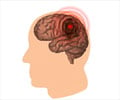Playing on a virtual reality gaming system may help stroke patients improve their motor function, according to a small study presented Thursday at a conference of the American Stroke Association.
Playing on a virtual reality gaming system may help stroke patients improve their motor function, according to a small study presented Thursday at a conference of the American Stroke Association.
"This is the first randomized clinical study showing that virtual reality using Wii gaming technology is feasible and safe and is potentially effective in enhancing motor function following a stroke," said Gustavo Saposnik, who led the study.Twenty stroke survivors were randomly assigned to play either two Wii games, Wii tennis and Wii "Cooking Mama," in which players simulate cutting a potato, peeling an onion, slicing meat and shredding cheese, or to play cards or a game called Jenga, which involves stacking and balancing wooden blocks.
Both groups played eight hour-long sessions of Wii, or cards and blocks, over the period of two weeks. Participants had suffered a stroke around two months previous.
No one in the Wii group suffered adverse effects in the study, while one person in the card or block-stacking group had nausea or dizziness during the study.
The study focused on getting the patients to move their impaired arms to help small- and large-muscle motor function, and the group that used the Wii showed "significant motor improvement in speed and extent of recovery," the researchers said.
"Basically, we found that patients in the Wii group achieved a better motor function, both fine and gross, manifested by improvement in speed and grip strength," Saposnik, who is director of the Stroke Outcomes Research Unit at St Michael's Hospital in Toronto, Canada, said.
Advertisement
A larger, randomized study is already up and running to see if Wii can be widely used as a form of therapy for stroke victims.
Advertisement
SRM















